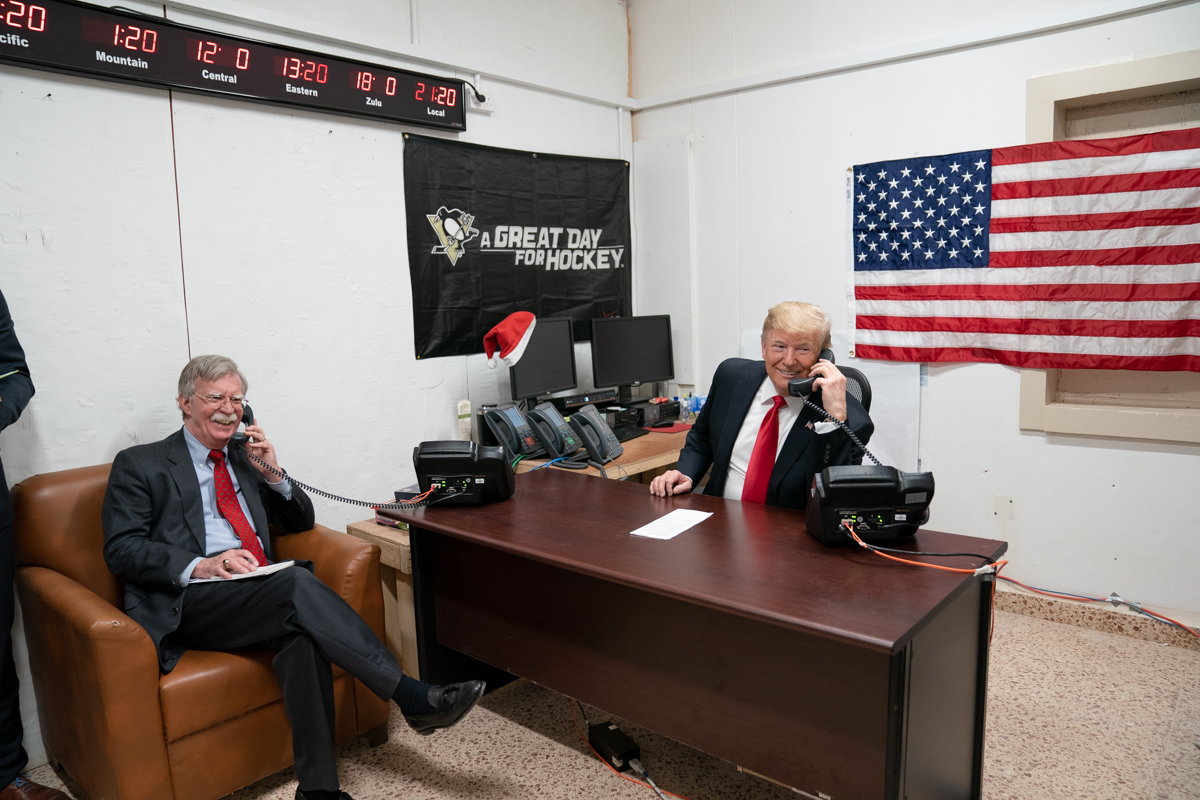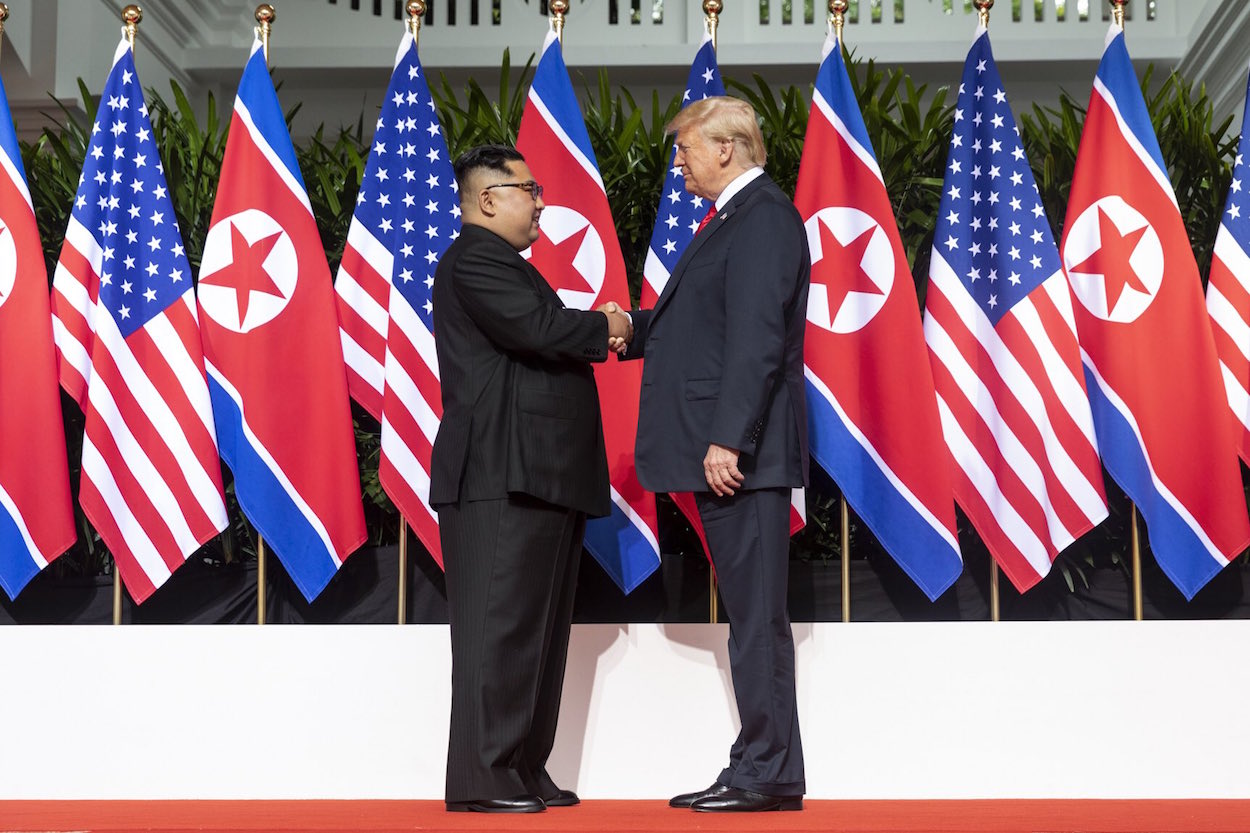by Brian Hioe
語言:
English
Photo Credit: White House
REACTIONS FROM China have, unsurprisingly, been unhappy regarding a recent meeting between American National Security Advisor John Bolton and Taiwanese National Security Council Secretary-General David Lee. China struck back at the meeting, claiming that “China is extremely dissatisfied and resolutely opposed to this”—referring to opposition against official exchanges between Taiwan and China. China also blasted Bolton for referring to Lee during comments as his “counterpart”, taking the view that this recognizes Lee’s status as a government official of a government that China considers illegitimate.
通話_30561066134.jpg) Then National Security Council secretary-general Joseph Wu, President Tsai Ing-wen, and then-Minister of Foreign Affairs David Lee during the Trump-Tsai phone call in December 2016. Wu and Lee have since swapped portfolios. Photo credit: Presidential Office
Then National Security Council secretary-general Joseph Wu, President Tsai Ing-wen, and then-Minister of Foreign Affairs David Lee during the Trump-Tsai phone call in December 2016. Wu and Lee have since swapped portfolios. Photo credit: Presidential Office
Bolton and Lee hold approximately corresponding positions in their respective governments. Consequently, the meeting between Bolton and Lee is the first such meeting to take place between high-ranking national security officials from America in Taiwan in approximately four decades, the last such meeting taking place in 1979. The trip took place during a visit to America by Lee from May 13th through May 21st.
The Taiwanese and American governments have been generally quiet about what the meeting actually entailed. The Taiwanese Ministry of Foreign Affairs issued a statement that: “During the trip, together with US government officials, Secretary-General Lee met with representatives from our diplomatic allies, reiterating support and commitment to a free and open Indo-Pacific region.” The statement remains relatively vague in not referring to Lee’s meeting with Bolton, yet refers to the Trump era geopolitical framework of the “free and open Indo-Pacific,” which has long since been adopted by the Taiwanese Ministry of Foreign Affairs. Notably, Taiwanese president Tsai Ing-wen gave opening comments at the Indo-Pacific Security Dialogue in April, suggesting that the Trump administration’s vision of a “free and open Indo-Pacific” dovetails with the New Southbound Policy.
At the same time, it has not gone unnoticed that the meeting has large implications. Though the meeting would have been understood by international observers as significant even as an isolated event, some read the meeting as having been timed to take place in a similar timeframe to the annual Han Kuang military exercises which took place in April, the annual Wan An air raid drill or America sending warships through the Taiwan Straits last week—breaking from the usual pattern of having two months between any period in which America sends warships through the Taiwan Straits. Likewise, after the meeting, the Tsai administration announced that Taiwan’s de facto embassy in the US, the Coordination Council for North American Affairs would be Taiwan Council for U.S. Affairs, seen as signaling stronger US-Taiwan ties.
Indeed, certainly American political and military support of Taiwan has strengthened in the past year, as a bipartisan political move from both Democrats and Republicans. Yet it may not be surprising either that an uncritical celebration of the meeting between Bolton and Lee has ensued in Taiwan in past days. Few seem ready to look a gift horse in the mouth, generally seeing the meeting between Bolton and Lee as a sign of uniformly stronger support for Taiwan by the Trump administration.
 American National Security Advisor John Bolton (left) and American president Donald Trump (right). Photo credit: White House
American National Security Advisor John Bolton (left) and American president Donald Trump (right). Photo credit: White House
Again, it is true that American political and military support of Taiwan has increased in the past year. Yet it remains unclear as to the constellation of political forces within the American government that has allowed for this. Analysts in Taiwan oftentimes remain inattentive, if not wholly unaware, of internal splits with the Trump administration or as to what any negative implications of aligning with certain forces in the Trump administration could be.
Little discussion has gone, for example, rising concerns that America is on the brink of war with Iran, as precisely pushed for by hawks and political hardliners in the Trump administration such as Bolton. Bolton has been quite consistent in his political support for Taiwan as a result of long-held political antipathy towards China—Bolton advocates a stronger American political and military stance toward China, much as he also does against Iran, North Korea, Venezuela, and did with Iraq and Afghanistan before that.
Affiliation with Bolton by Taiwan could actually reflect badly on international perceptions of Taiwan, with the perception that American support for Taiwan is simply aimed at provoking tensions with China—in a similarly rash manner to how many view America’s actions vis-a-vis Iran. Likewise, too closely affiliating with individuals such as Bolton could risk the current bipartisan support of Taiwan in America, alienating Democrats who oppose the Trump administration’s foreign policy moves as impetuous. But in Taiwan there continues to be little awareness of the fact that support for Taiwan is bipartisan, with an undue focus placed on past Democratic presidents who built closer relations with China. As such, the prevailing view remains that Taiwan is only aided by traditional Republican allies of Taiwan.
To this extent, there has been little discussion in Taiwan of the internal splits within the Trump administration. Trump continues to push for a stronger American stance against China, as observed in American escalation of the US-China trade war. And certainly, Bolton remains a figure in the Trump administration highly opposed to China. Nonetheless, Trump has broken from Bolton regarding negotiations with North Korea regarding its nuclear disarmament, seeming to side with Kim Jong-un over his own National Security Advisor.
 North Korean leader Kim Jong-un (left) and American president Donald Trump (right). Photo credit: Public Domain
North Korean leader Kim Jong-un (left) and American president Donald Trump (right). Photo credit: Public Domain
As such, it continues to be a question as to whether Trump could, similarly, suddenly reverse course on the issue of China—as he has done in the past—in defiance of Bolton. Few have contemplated this possibility in Taiwan, still seeing the Trump administration in homogeneous terms.
But such blind spots in views of America should not surprise in Taiwan, given blind idealization of America which has persisted for decades. One does not expect this to change in the near future, pending any political seismic shifts.

